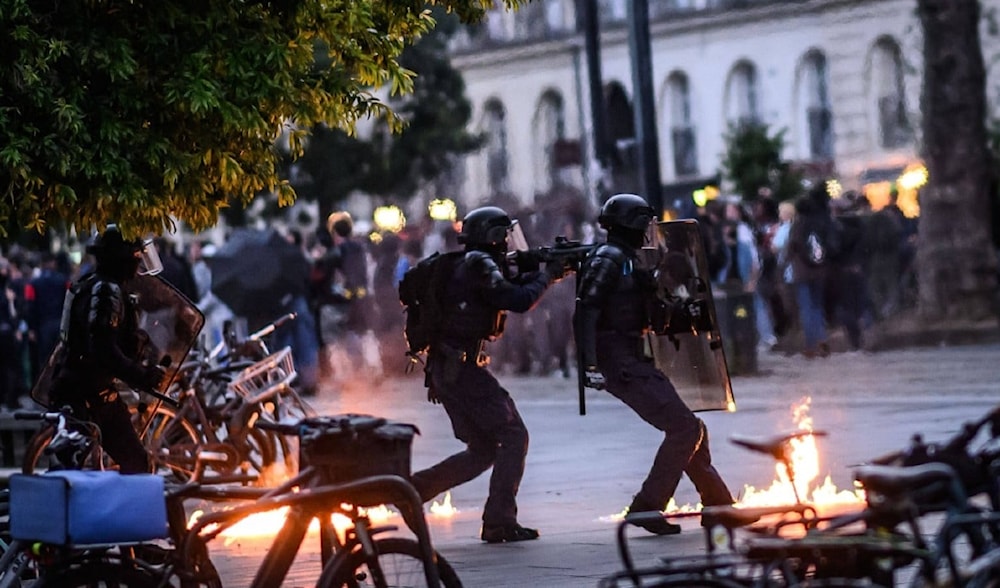Violent riots erupt after leftists win French parliamentary elections
Violent demonstrations took place across France following the defeat of the highly-anticipated right-wing National Rally to the left-wing New Popular Front coalition.
-

Riot police in Nantes, western France, July 8, 2024. (AFP)
Violent nationwide protests erupted on Sunday after the left-wing New Popular Front (NPF) coalition's unexpected win, which allowed the alliance to secure the most seats in France's parliamentary elections.
The circulated footage showcased masked protesters igniting flames and causing violent disturbances throughout the streets of France, resulting in thousands of riot police being deployed following the loss of the far-right National Rally (RN).
The protests erupted after the election results were announced. The NPF obtained 182 seats, while President Emmanuel Macron's centrist alliance secured the second-place position with 163 seats. Despite the RN's strong electoral triumph in the first round, it attained third place, acquiring 143 seats in parliament.
French leftist leader Jean-Luc Mélenchon described the left wing's victory as an "immense relief for a majority of people in our country."
Following the defeat of Macron's centrist alliance, the president's Prime Minister Gabriel Attal announced his resignation but said he will continue to "stay on as long as necessary" due to the upcoming Paris Olympics that will be held later this month.
However, the French Presidency later stated that Macron decided to keep Attal as PM.
Meet France's left-wing coalition leaders
With the far-right French winning the European parliamentary elections last month, the left-wing parties united in a coalition led by Jean-Luc Mélenchon.
However, the leftist founder of the La France Insoumise party faced severe criticism for his stances regarding the war on Gaza, and some accused him of "antisemitism".
Following the coalition's leading election results, Mélenchon said, on Sunday, "We must recognize the State of Palestine."
This coalition has been perceived by some as weak, especially since it includes different party leaders. However, what reportedly united them was their opposition to Jordan Bardella from the National Rally and French Prime Minister Gabriel Attal.
Green Party led by Marine Tondelier
Marine Tondelier, leader of the Green Party, emerged as one of the prominent voices in the left-wing campaign during these elections.
Early on, the 37-year-old candidate called on the NFP, in the face of the far-right, advocating a joint effort to withdraw candidates in the second round in favour of those best positioned to defeat the far-right.
Tondelier also confronted members of Macron's coalition, which she said resembles the far-right.
Tondelier has led the French Green Party since December 2022. She hails from the northern town of Hénin-Beaumont. Last week, she also remarked that the debates in these elections were "very male-dominated" after her participation in the final debate on BFMTV was canceled in favor of individual interviews.
Many French newspapers have described Tondelier, recognizable by her signature green jacket, as a leading new voice for the left wing.
La France Insoumise led by Jean-Luc Mélenchon
Jean-Luc Mélenchon, a leftist, founded his current party La France Insoumise in 2016 before running for the presidency for the second time in the 2017 elections.
The 72-year-old politician has had a long career in politics: he became a member of the House of Representatives at the age of 35, a European legislator in 2009, and finished third behind Emmanuel Macron and Marine Le Pen in the 2022 presidential election.
Socialist Party led by Olivier Faure
Socialist Party leader Olivier Faure was the first person to speak on behalf of the NFP in the election debates.
Trained as a lawyer, Faure became an advisor to Labor Minister Martine Aubry in 1997 and later a deputy to François Hollande when the former president was leading the Socialist Party.
Faure was first elected as a member of parliament in 2012 and began leading the Socialists in 2018. By that time, the party had lost much of its support, with Macron securing a majority in the National Assembly with his presidential party.
At the local level, the Socialists remain a political force. They also recently advanced in the European elections with a coalition list led by Raphaël Glucksmann.
Communist Party led by Fabien Roussel
Fabien Roussel has led the French Communist Party since 2018, after being first elected to parliament in 2017.
He grew up in northern France and worked as a journalist before entering politics, joining the Young Communists movement early on.
Roussel lost his seat in the first round of early legislative elections to a far-right candidate and was less present during the campaign than other members of the coalition.

 5 Min Read
5 Min Read








